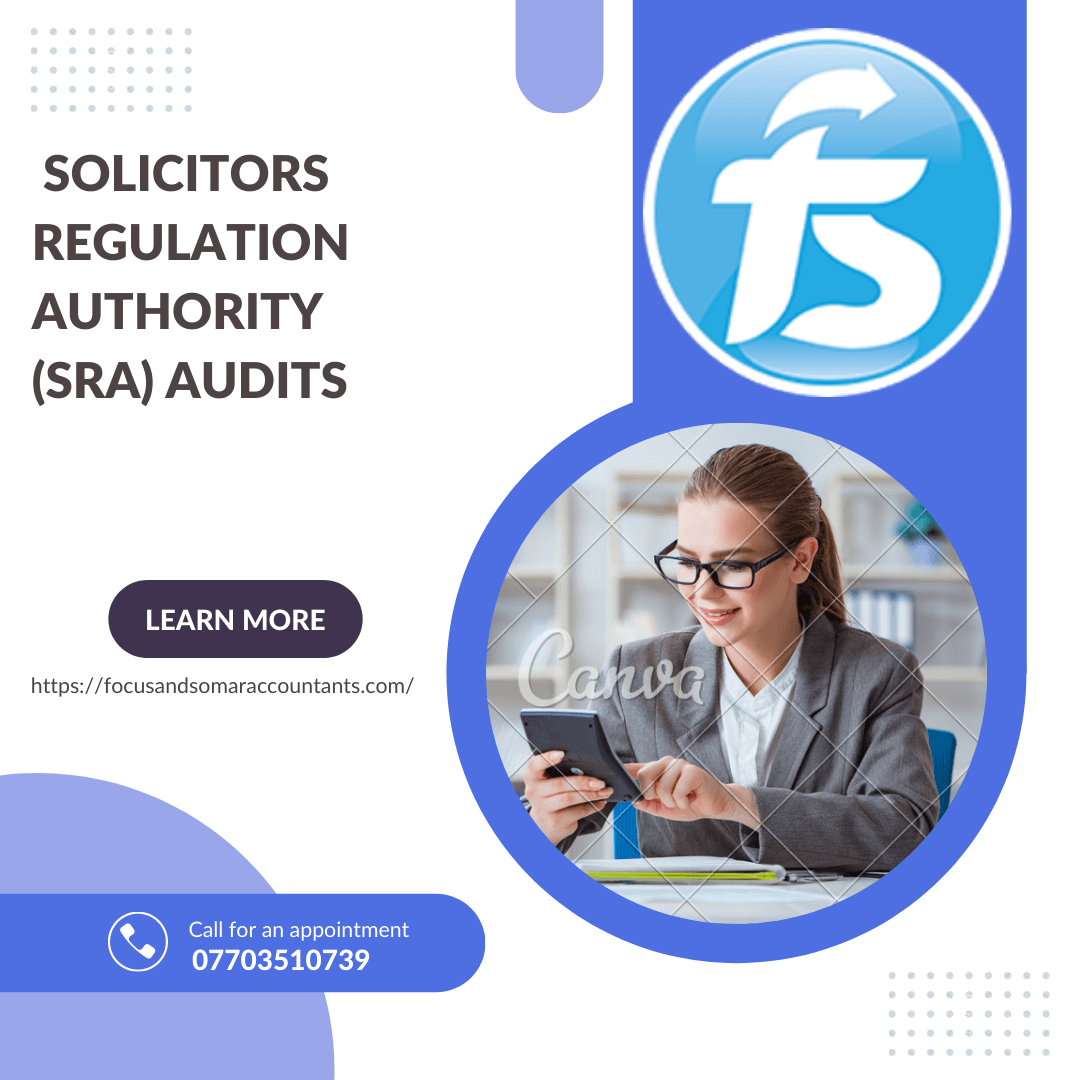
24 Mar, 2022 admin
Solicitors Regulation Authority (SRA) Audits is an audit which is prepare to show or report the money passing through clients account by the solicitors. The SRA is one of several regulatory agencies in the legal profession.
SRA audits are exclusive to the legal industry and firms that have registered with the SRA. SRA audit is necessary whenever any solicitor, law firm, or manager of a solicitors or attorneys firm in England or Wales holds client money as part of their services.
Why Solicitors Regulation Authority (SRA) Audits is require?
The Solicitors Regulation Authority (SRA) audits make sure everything is in order. And also ensures that transactions are complied with the SRA accounts rule. So, Solicitors and law firms must maintain separate client bank accounts and adhere to tight protocols for reconciling the accounts on a regular and consistent basis.
Following the completion of an SRA audit, they will deliver a report confirming that everything is in order and that the proper procedures are in place. And will highlight any issues that is detect while going through the report.
The SRA can levy heavy fines if it discovers any irregularities. And also if it finds that the processes are not followed. Non-compliance is regard extremely seriously, so it is critical that attorneys and solicitor companies have a clear audit report each year.
So, all solicitors are now required to:
- Show confirmation that every client funds are secure.
- Assure clients that they are set up to protect their money.
- Assure clients and the wider public that funds are handles properly.
- Provide any issues or information relating to the protection of client funds to the SRA.
Who is SRA and what they do?
The SRA (Solicitors Regulation Authority) is a body that regulates lawyers. They establish Principles and a Code of Conduct for individuals who are regulate by them to follow in order to provide legal services. So, SRA ensure that the people and businesses they regulate act independently and with integrity in the best interests of their clients and the general public.
They regulate corporations and persons and also have the authority to take enforcement action against those who violate their Principles. They have a variety of legal rights that allow them to take a variety of steps depending on the severity of the breach and the risk to the public and profession.
SRA also ensure that those they regulate are qualified to provide legal services by:
- Establishing qualification standards in England and also in Wales,
- Monitoring the performance of training organizations that provide qualifications
- Mentoring students who are training to become solicitors
- Assessing the character and suitability of lawyers they regulate,
- Administering the role of Solicitors
- And ensuring that lawyers from other countries (RELs and RFLs) meet their standards of practice.
The SRA’s primary concerns were:
- the safekeeping of the client funds
- provision in regard to banking services
- retention of client funds unnecessarily
- the introduction of additional checks on procedures of the operation of clients’ own accounts
- and official documentation of office policies along with its control processes
Accountants are now subject to a new SRA rule
For the first time in over 20 years The Solicitors Regulation Authority Accounts Rules is being revamp. Because the new Rules will take effect immediately on November 25, 2019, adjustments to your systems and procedures is necessary.
At first look, the old guidance seems to be a repeat in the new guideline. But there are a few key differences to be aware of. To guarantee continuous compliance with the Rules, law firms must consider the consequences for their accounting methods as well as systems for dealing with client money beginning November 25, 2019.
Here are some of the important differences to note after the changes:
- The definition of client money has been altered (revised rule 2.1)
- Professional and non-professional payments are no longer distinguish, and SDLT and unpaid HMLR fees are still customer funds in the general definition.
- Rule 2.2 is used only for the costs charge and the costs incur on behalf of the customer. And if the customer is being notify in advance, the entity will withhold certain types of customer funds other than the customer’s account.
- In accordance with Rule 2.3 (b) Payments from legal aid agencies are not retained in the customer account
- Firms shall not provide banking services through their client account, according to Rule 3.3.
- The new rules state that if you cease to act as an authorized entity and hold or operate a client account, or it is otherwise in the public interest, you may be required to seek or deliver an accountant’s report.
Now the terminology has become different as per new SRA rules:
The new terminologies are mention below:
| Before | After Change (Now) |
| Office Account | Business Account |
| Clients | Customers |
| Office Money | Phased Out |
Solicitors Regulation Authority (SRA) changes and its challenge:
The new Regulations are more subject to interpretation by the law firm itself. The reduction in number of principles from 10 to 7, shorter codes of conduct. And also the simple accounting rules are the new changes to be aware of. So, now the code of conduct is separate for solicitors and law firms, which is much simpler to understand. The accounting rules are no more perspective like the previous one because of the changes.
The new changes although simplify many things yet it is very challenging. However, if the firms take it as an opportunity it will help legal professionals to understand the new regulation requirements and comply accordingly.
There might be some disruption but with positive development. But, putting into effect principles-base policies through a system design to assure adherence to extremely a precise standard necessitates both thought and debate.
If you want to get in touch with Focus Somar and speak to our experts in-depth;
Please call 02038027810 Krishna Dahal, or email krishna@focusaccountants.co.uk to get direct professional assistance.
 Request A call Back
Request A call Back